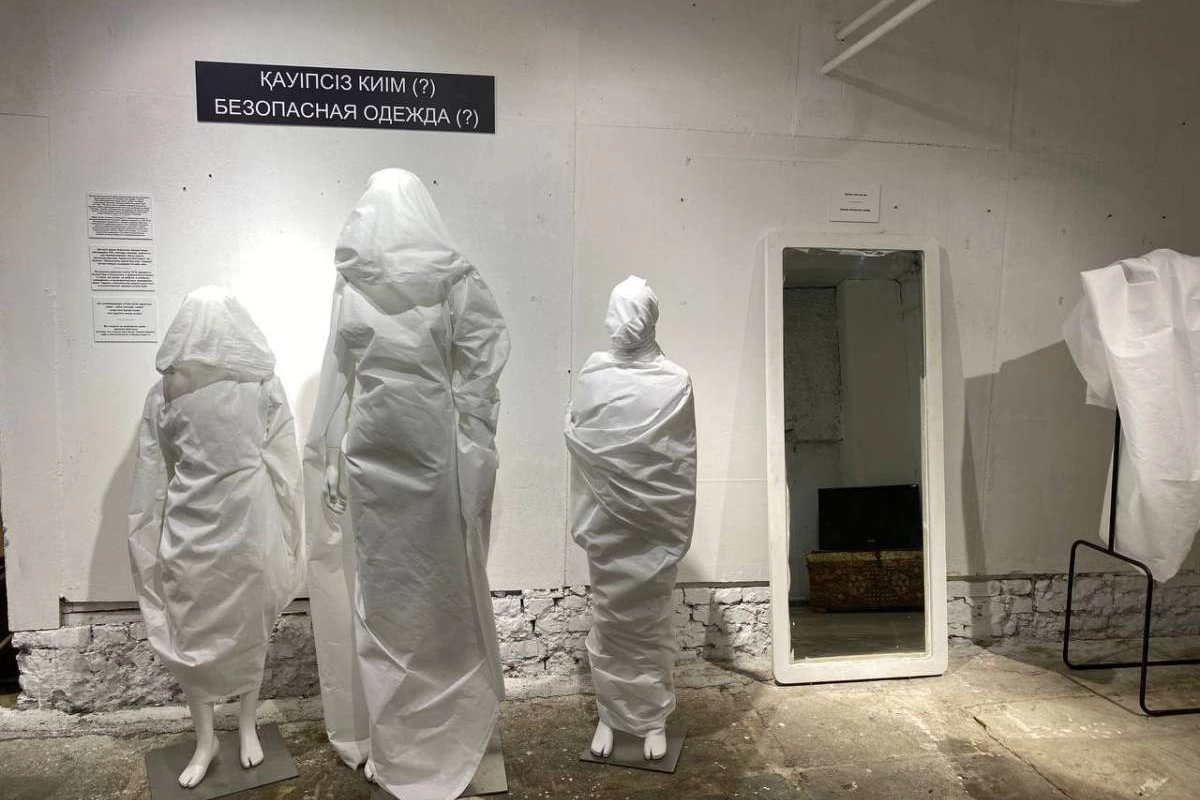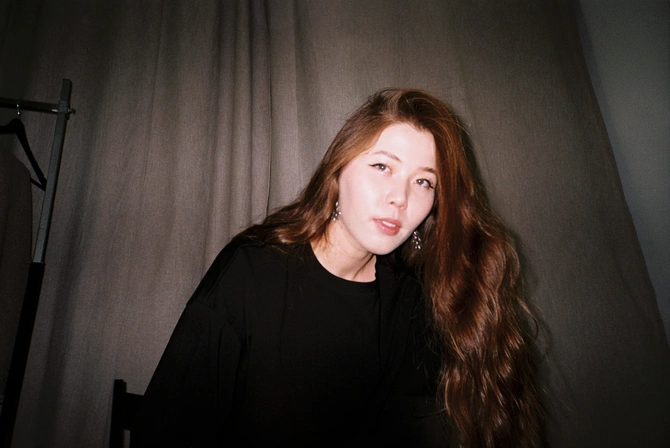
Journalist and blogger Ulpan Ramazanova talked to us about her first art installation, “Safe Clothing(?)” in Almaty, organized to debunk the myth that sexual harassment is a result of what a victim wears and her own involvement in this “difficult and unpleasant topic” to give voice to the anonymous victims through her projects.
Image: courtesy photo
“The only clothing in which you can feel safe is a shroud because they will stop harassing you only after death, but even that is not a fact,” says Ulpan Ramazanova, a 28-year-old journalist-turned-blogger and the organizer of the recent installation “Safe Clothing (?)” in Almaty this September. For five days (Sep 5-10), visitors could not only view the installation but take part in it by sharing their stories.
Ramazanova explains that although she was inspired by Marina Abramovic's book Walk Through Walls, she is not a conceptual artist or performer, so when putting together her first installation, her goal was simple and clear—to specify the meaning without leaving it to the visitors of the installation to figure it out. The mannequins represent the dead, and as the shroud is used for covering the dead in the Muslim faith, it becomes clear that the author was trying to counter the common perception in the patriarchal society that clothes can justify the sexual harassment that a victim was subjected to. As Ramazanova sees it, the only clothing that can be considered “safe” is that of a dead person.
This is not the first exhibition focusing on sexual harassment victims in Almaty. A similar exhibition, “Kiimdi Kinalama” (Don’t Blame the Clothes) in 2018 presented the clothes that victims wore when they were raped. Unfortunately, five years, later the stereotype in Kazakhstani society hasn’t been erased as of yet. There are still those who believe that sexual harassment is related to what a person is wearing.
Ramazanova’s idea to focus on the topic of sexual harassment comes from the revelations of her followers. “I have always been close to the values of protecting women's rights and creating a women's community. My mission is simple—so that girls in Kazakhstan do not feel as lonely or defenseless as I felt ten years ago. I started my blog with empathy, and people responded and told their stories. At some point, I decided to make a video where strangers read each other’s anonymous stories. I shot this video, and at some point, it went viral on Instagram and TikTok. There were a lot of anonymous stories. They were all about harassment by very close people.”

After that, Ramazanova filmed another viral video, which gained over 1,5 million views on TikTok. The idea was simple. She went to Almaty’s Arbat Street with a “Hug me if you were harassed” sign. As a result, about 40 people came to hug her, and others soon recreated the idea. “I can’t say that the topic of harassment has become my niche. I want it not to be a niche for anyone so that the problem disappears and is eradicated,” she says. However, after her TikTok video, she started receiving even more sexual harassment stories from people. “I would open Instagram and see up to 100 messages about harassment in requests,” Ramazanova remembers. Unable to continue facing these messages and not being able to help, the idea was born. “Why don’t I make an installation?” Ramazanova asked herself, and the next thing she did was consult with an art curator and contact the 101 Dump Gallery in Almaty to set the dates of the installation. “I’m not a performance artist, but I’m a person. I’m going through my personal growth, and I thought, who said that it’s impossible? I'll go and do it,” Ramazanova explains.
Besides the mannequins in shrouds, people had the opportunity to come and write their stories. On the last day of the installation, there was the so-called “reading” part, where people could read out their own stories if they were comfortable, or strangers could read other’s stories anonymously. “This was important for me because I noticed that when people tell their story, their inner space no longer belongs to the abuser or rapist. They release their story into some open space, and it becomes easier for them,” she says. “There were tears and revelations. The problem had a face, human voice, shape, and weight, and began to be perceived differently.”
After the readings, a lecture by Ph.D. lawyer Khalida Zhigulova gave some hope to the visitors as she encouraged them to know their rights and not perceive themselves as “powerless objects” but instead to go into politics and talk about these issues publicly. “it was important for me to close with such legal instructions, so that those who came and who read, would feel that there is hope. You need to take everything into your own hands—no one will come and save you,” Ramazanova says in conclusion.
Following her debut exhibition’s success, she doesn’t plan to cease her activism. “I realized that if I want to convey the meaning, then the form is not important—the meaning is important. I did this installation, and I liked it. I want to do this type of work every two months,” Ramazanova explains, hinting that there is an upcoming project in the near future.
As for her own career, she is also a founder of Tanym Pro, a mental coaching support service launched in July 2022, following the launch of her first similar project, Tanym Social, a psychological assistance service run by donations from 1000 tenge (around $2), which after being active for three years is currently on a technical break. As of recently, the former journalist is currently writing her first non-fiction book for a Kazakh publishing house. The book’s working title is 100 Letters from an Elder Sister, and as Ramazanova clarifies it will be an encyclopedia for young women from 20 to 25 years old about relationships with themselves, with family, body, health, and money. Ramazanova is currently interviewing other women experts in their fields for the book to be truly valuable for her readers. “I hope the book will be published next year,” she says.
Share on social media